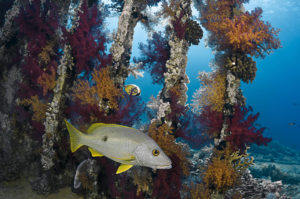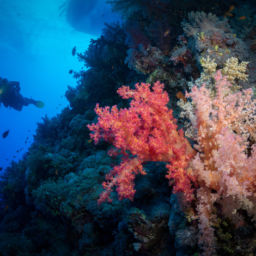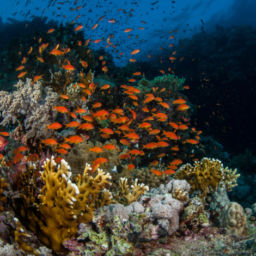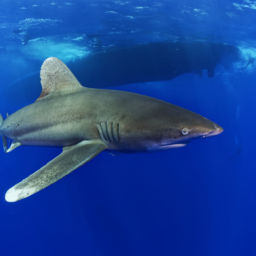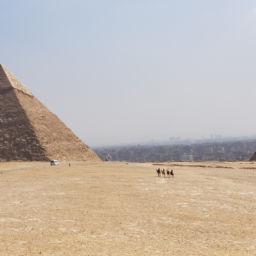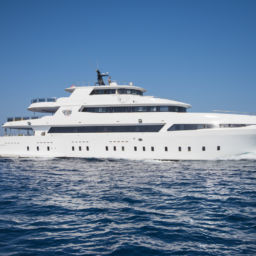The Red Sea resort of Sharm el Sheikh, Egypt used to be many European divers’ favorite getaway, with colorful coral reefs, an abundance of fish, historic wrecks and a warm year-round climate. And with all that only a short flight away from anywhere in Europe, what’s not to love? A few years ago, however, things went quiet because of political unrest. But the resort town is poised to make a comeback, and the scuba diving in Sharm el Sheikh offers much to draw divers in.
Whale sharks, hammerheads, reef sharks, eagle rays — all are regular visitors to Sharm. Add to that schooling trevallies, batfish and other reef fish, and it’s easy to see why Sharm el Sheikh has had its best season for marine life in a few years.
Before the divers came, the town of Sharm el Sheikh was nothing but a Bedouin camp at the southern tip of the Sinai Peninsula. Since then, it’s morphed into several sprawling villages/small towns. These are home to both dive centers and a growing expat community, as well as Egyptians, many of whom moved to the area to take advantage of the local job opportunities. Naama Bay is the busiest and arguably most popular area, while the original Sharks Bay is more laid-back. Both have a choice of dive centers catering for anyone from beginners to seasoned tech divers.
While there used to be several dozen dive centers attracting customers in Naama Bay alone, some of them have downsized their operations in recent years due to the decreasing number of direct flights to the area. Elise Watling has worked as a dive instructor in Sharm for nine years and is currently looking after Emperor Divers’ guests.
“It’s true that there are fewer guests in Sharm now,” she says “but on the upside, the dive sites have had a chance to recover and we’ve seen healthier coral and larger numbers of marine life.
“Many dive centers are now combining guests on one boat rather than sending individual boats out half empty. That way, we’re still able to offer guests the full range of diving in this beautiful part of the world.”
If you’re heading to Sharm, don’t miss diving both the Ras Mohammed National Park and the islands in the Straits of Tiran. Most dive centers visit these areas on alternate days. A little further afield are the Dunraven and the not-to-be-missed Thistlegorm shipwrecks.
Ras Mohammed National Park
This nature reserve covers coral reefs as well as inland areas right at the tip of the Sinai Peninsula. It’s also home to some of Sharm el Sheikh’s most spectacular dive sites.
Shark and Yolanda
A large reef wall with another satellite pinnacle nearby joins Shark and Yolanda pinnacles. No trip to Sharm would be complete without diving here. Yolanda takes its name from a supply ship carrying bathroom fittings, including bathtubs, sinks and — yes, toilets — that divers can see in 50 to 100 feet (15 to 30 m). The fittings have become artificial reefs in their own right, creating excellent hiding places for fish as well as great photo opportunities. The wreck of the Yolanda itself has slid off the reef and currently lies well below 325 feet (100 m), only accessible to highly qualified technical divers.
Nearby Shark Pinnacle forms the top of a deep wall that is a favorite with technical divers. Because the current constantly changes around this site, no two dives on Shark and Yolanda are ever the same and dive guides frequently visit different parts of the reef. This site is well worth more than one dive.
Jackfish Alley
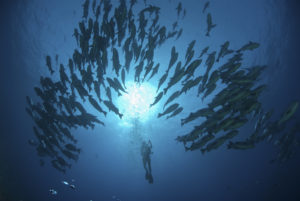 With this site, the clue truly is in the name. During June, July and August, this site is home to spectacularly large schools of jackfish. It’s a great site the rest of the year as well, with a reef wall dropping to over 65 feet (20-plus m) where it gives way to a large reef plate. Pinnacles on this plate attract hundreds of glassfish and colorful anthias, as well as larger species. Dives often start or end with a shallow swim-through on the reef wall.
With this site, the clue truly is in the name. During June, July and August, this site is home to spectacularly large schools of jackfish. It’s a great site the rest of the year as well, with a reef wall dropping to over 65 feet (20-plus m) where it gives way to a large reef plate. Pinnacles on this plate attract hundreds of glassfish and colorful anthias, as well as larger species. Dives often start or end with a shallow swim-through on the reef wall.
Straits of Tiran
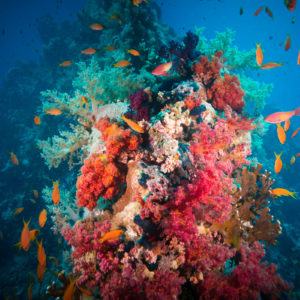 In the middle of the narrow body of water between the Sinai and the Arab peninsula lie four reefs that have put the Straits of Tiran on the diving map: Gordon, Thomas, Woodhouse and Jackson.
In the middle of the narrow body of water between the Sinai and the Arab peninsula lie four reefs that have put the Straits of Tiran on the diving map: Gordon, Thomas, Woodhouse and Jackson.
All offer colorful, pristine coral reefs and a chance to see pelagic species, including reef sharks, jackfish and many more.
Thomas Reef also features a narrow canyon with two arches. While recreational divers can explore the top of Thomas Canyon, only techies may visit the arches because of their depth.
The Thistlegorm
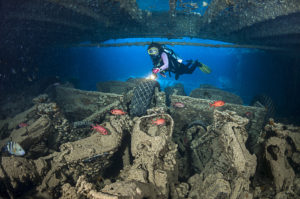 Prepare for an early start from Sharm to reach the famous Thistlegorm wreck, but it’s well worth it. This World War II cargo ship sits on the sea bottom in 100 feet (30 m), making it an excellent opportunity for nitrox dives. Despite its time underwater, the wreck remains intact enough to provide penetration opportunities for recreational divers. Visitors can see the remains of trucks, motorcycles and rubber boots. On the journey from Sharm el Sheikh, watch for a spectacular Red Sea sunrise, a real treat even before arriving at the wreck. Once there, most trips will include a dive around the outside of the wreck, usually at slack tide. The second dive lets divers explore the inside of the wreck with its two distinct decks.
Prepare for an early start from Sharm to reach the famous Thistlegorm wreck, but it’s well worth it. This World War II cargo ship sits on the sea bottom in 100 feet (30 m), making it an excellent opportunity for nitrox dives. Despite its time underwater, the wreck remains intact enough to provide penetration opportunities for recreational divers. Visitors can see the remains of trucks, motorcycles and rubber boots. On the journey from Sharm el Sheikh, watch for a spectacular Red Sea sunrise, a real treat even before arriving at the wreck. Once there, most trips will include a dive around the outside of the wreck, usually at slack tide. The second dive lets divers explore the inside of the wreck with its two distinct decks.
While we’re only covering a small selection of sites here, Sharm el Sheikh easily has enough sites to keep divers entertained for a week or more.
Details: EgyptAir flies from the U.S. and the U.K. with a short connection in Cairo and generous luggage allowance. Turkish Airlines also flies from the U.K. via Istanbul. Many charter airlines fly direct from various European cities as well.
It’s possible to arrive and book your diving locally, but some of the best deals are available to divers who book online before arriving. Packages usually include airport pick-up, which means your holiday is off to an easy start. To see larger schooling fish, summer is the best time to go (June through September), but the diving here is great year-round.


